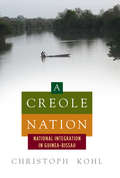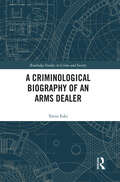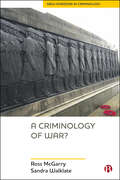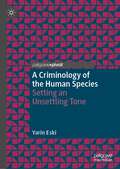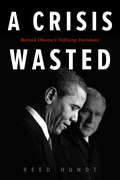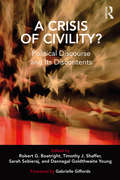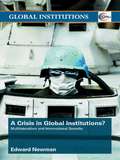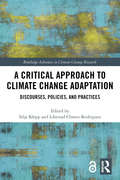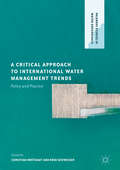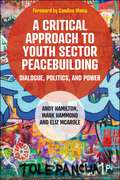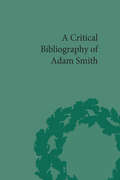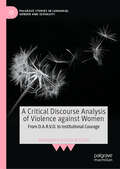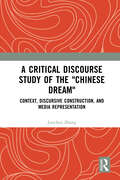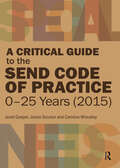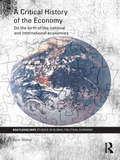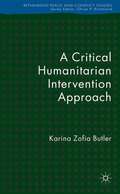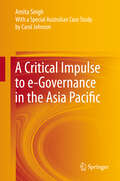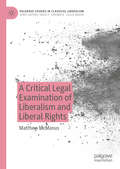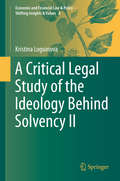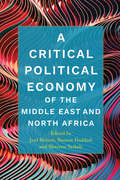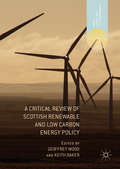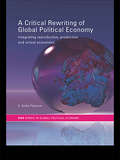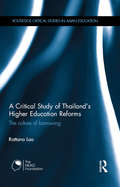- Table View
- List View
A Creole Nation: National Integration in Guinea-Bissau
by Christoph KohlDespite high degrees of cultural and ethnic diversity as well as prevailing political instability, Guinea-Bissau’s population has developed a strong sense of national belonging. By examining both contemporary and historical perspectives, A Creole Nation explores how creole identity, culture, and political leaders have influenced postcolonial nation-building processes in Guinea-Bissau, and the ways in which the phenomenon of cultural creolization results in the emergence of new identities.
A Criminological Biography of an Arms Dealer (Routledge Studies in Crime and Society)
by Yarin EskiFor many, the arms trade and its dealers are the root cause of regional wars and global terrorism. In both public and academic debates, arms dealers are considered immoral as they profit from conflict, due to their key position in the international arms trading business. Nevertheless, there seems to be little to no interest in the personal lives of those actively involved. In his criminological biography of a licensed arms dealer, Yarin Eski provides an in-depth, interdisciplinary approach to and understanding of the global arms trade, revealing a deep insider view placed in a wider sociocultural context. From early discussions about childhood and career choices, to reflections on becoming and being an arms trader, Eski offers a methodologically embedded approach and advances biographical writing in the field of Criminology. It is a unique and thought-provoking contribution to the fields of criminology, ethnography, sociology, critical security studies, policing studies, war studies and international politics and offers an unparalleled insight from within.
A Criminology of War? (New Horizons in Criminology)
by Sandra Walklate Ross McGarryIn recent years, the academic study of ‘war’ has gained renewed popularity in criminology. This book illustrates its long-standing engagement with this social phenomenon within the discipline. Foregrounding established criminological work addressing war and connecting it to a wide range of extant sociological literature, the authors present and further develop theoretical and conceptual ways of thinking critically about war. Providing a critique of mainstream criminology, the authors question whether a ‘criminology of war’ is possible, and if so, how this seemingly ‘new horizon’ of the discipline might be usefully informed by sociology.
A Criminology of the Human Species: Setting an Unsettling Tone (Palgrave Studies in Green Criminology)
by Yarin EskiThe book sketches out how the criminological lens could be used in the climate change debate around possible human extinction. It explores the extent to which the human species can be considered deviant in relation to other species of the contemporary biosphere, as humans seem to be the only species on Earth that does not live in natural balance with their environment (anymore). It discusses several unsettling topics in the public debate on climate change, specifically the taboo of how humans may not survive the ongoing climate change. It includes chapters on the Earth’s history of mass-extinctions, the global state of denial including toward the possibility that the human species could go extinct, and it considers humans' future as a deviant, fatal species outside of Earth, in outer-space, possibly on other planets. It puts forward and enriches the critical criminological tradition by conceptualizing and setting an unsettling tone within criminology and criminological research on the human species and our extinction, by daring criminologists (and victimologists) to ponder and seek empirical answers to controversial imaginations and questions about our possible extinction.
A Crisis Wasted: Barack Obama's Defining Decisions
by Reed Hundt&“The blow by blow story of a president and his team wasting the &‘opportunity&’ of the Great Recession to change the fundamentals of the economy.&” —Steven Brill, New York Times–bestselling author This book is the compelling story of President Obama&’s domestic policy decisions made between September 2008 and his inauguration on January 20, 2009. Barack Obama determined the fate of his presidency before he took office. His momentous decisions led to Donald Trump, for Obama the worst person imaginable, taking his place eight years later. This book describes these decisions and discusses how the results could have been different. Based on dozens of interviews with actors in the Obama transition, as well as the author&’s personal observations, this book provides unique commentary of those defining decisions of winter 2008–2009. A decade later, the ramifications of the Great Recession and the role of government in addressing the crisis animate the ideological battle between progressivism and neoliberalism in the Democratic Party and the radical direction of the Republican Party. As many seek the presidency in the November 2020 election, all candidates and of course the eventual winner will face decisions that may be as critical and difficult as those confronted by Barack Obama. This book aims to provide the guidance of history. &“A powerfully lucid, compelling and surprising achievement . . . makes a subtle but irresistible argument that, given the conservative undertow of American politics, liberals and progressives who are serious about change can&’t just wing it but must prepare detailed economic policy analyses and prescriptions long in advance of taking power.&” —Congressman Jamie Raskin, Representative from Maryland&’s 8th District
A Crisis of Civility?: Political Discourse and Its Discontents
by Robert G. Boatright Sarah Sobieraj Timothy J. Shaffer Dannagal Goldthwaite YoungThe state of political discourse in the United States today has been a subject of concern for many Americans. Political incivility is not merely a problem for political elites; political conversations between American citizens have also become more difficult and tense. The 2016 presidential elections featured campaign rhetoric designed to inflame the general public. Yet the 2016 election was certainly not the only cause of incivility among citizens. There have been many instances in recent years where reasoned discourse in our universities and other public venues has been threatened. This book was undertaken as a response to these problems. It presents and develops a more robust discussion of what civility is, why it matters, what factors might contribute to it, and what its consequences are for democratic life. The authors included here pursue three major questions: Is the state of American political discourse today really that bad, compared to prior eras; what lessons about civility can we draw from the 2016 election; and how have changes in technology such as the development of online news and other means of mediated communication changed the nature of our discourse? This book seeks to develop a coherent, civil conversation between divergent contemporary perspectives in political science, communications, history, sociology, and philosophy. This multidisciplinary approach helps to reflect on challenges to civil discourse, define civility, and identify its consequences for democratic life in a digital age. In this accessible text, an all-star cast of contributors tills the earth in which future discussion on civility will be planted.
A Crisis of Global Institutions?: Multilateralism and International Security (Global Institutions)
by Edward NewmanThe legitimacy of global institutions which address security challenges is in question. The manner in which they make decisions and the interests they reflect often falls short of twenty-first century expectations and norms of good governance. Also, their performance has raised doubts about their ability to address contemporary challenges such as civil wars, weapons of mass destruction, terrorism, and the use of military force in international politics. Addressing topical issues, such as the war against Iraq in 2003 and terrorism, and presenting provocative arguments, A Crisis of Global Institutions? explores the sources of the challenge to multilateralism – including US pre-eminence, the changing nature of international security, and normative concerns about the way decisions are taken in international organizations. Edward Newman argues that whilst some such challenges are a sign of ‘crisis’, many others are representative of ‘normality’ and continuity in international relations. Nevertheless, it is essential to consider how multilateralism might be more viably constituted to cope with contemporary and future demands.
A Critical Approach to Climate Change Adaptation: Discourses, Policies and Practices (Routledge Advances in Climate Change Research)
by Silja Klepp Libertad Chavez-RodriguezThis edited volume brings together critical research on climate change adaptation discourses, policies, and practices from a multi-disciplinary perspective. Drawing on examples from countries including Colombia, Mexico, Canada, Germany, Russia, Tanzania, Indonesia, and the Pacific Islands, the chapters describe how adaptation measures are interpreted, transformed, and implemented at grassroots level and how these measures are changing or interfering with power relations, legal pluralismm and local (ecological) knowledge. As a whole, the book challenges established perspectives of climate change adaptation by taking into account issues of cultural diversity, environmental justicem and human rights, as well as feminist or intersectional approaches. This innovative approach allows for analyses of the new configurations of knowledge and power that are evolving in the name of climate change adaptation. This volume will be of great interest to students and scholars of climate change, environmental law and policy, and environmental sociology, and to policymakers and practitioners working in the field of climate change adaptation.
A Critical Approach to International Water Management Trends
by Christian Bréthaut Rémi SchweizerThis edited volume provides a critical discussion of particular trends that are widely recognised to influence water management by comparing them with what is actually happening in the field. Among others, these trends include water security, adaptive or integrative management, and the water-energy-food nexus, which are often presented as essential means to reaching more sustainable and resilient water use. However, the extent to which these trends have managed to structure concrete practices in water management remains uncertain. Informed by empirically grounded research, each chapter of this work engages with a particular approach, concept or theory. Together, they provide a nuanced picture of trends in water management that require universal remedies and global norms.
A Critical Approach to Youth Sector Peacebuilding: Dialogue, Politics, and Power
by Mark Hammond Andy Hamilton Eliz McArdleUsing Northern Ireland as a compelling case study, this book offers a critique of peacebuilding approaches with young people in contested societies. In the north of Ireland, the spectre of murderous violence is increasingly distant for peace-agreement generations. However, legacies stemming from the 30 years of protracted conflict are ever-present in young people’s segregated lives. This book presents four distinctive viewpoints that inform contemporary peacebuilding work with young people, revealing divergent purposes and conflicting aspirations. Offering a new model to understand peacebuilding, the authors urge peacebuilding communities around the globe to embrace an increasingly politicising and participative youth peace praxis.
A Critical Assessment of the Intergovernmental Panel on Climate Change
by Mike HulmeThe Intergovernmental Panel on Climate Change (IPCC) has become a hugely influential institution. It is the authoritative voice on the science on climate change, and an exemplar of an intergovernmental science-policy interface. This book introduces the IPCC as an institution, covering its origins, history, processes, participants, products, and influence. Discussing its internal workings and operating principles, it shows how IPCC assessments are produced and how consensus is reached between scientific and policy experts from different institutions, countries, and social groups. A variety of practices and discourses – epistemic, diplomatic, procedural, communicative – that make the institution function are critically assessed, allowing the reader to learn from its successes and failures. This volume is the go-to reference for researchers studying or active within the IPCC, as well as invaluable for students concerned with global environmental problems and climate governance. This title is also available as Open Access via Cambridge Core.
A Critical Bibliography of Adam Smith
by Hiroshi MizutaThis critical bibliography of Adam Smith takes as its starting point the Kress Library of Business and Economics’ 1939 catalogue of its Vanderblue Collection of Smithiana. Since the bicentenary of The Wealth of Nations in 1976, the rate of international publication markedly accelerated, significantly extending the scope of this bibliography beyond 1939. Its scope has been further enlarged via the inclusion of essays on the diffusion process while the inclusion of all works in the chronological main bibliography gives an overview of the scope of this process. The notes appended to the entries provide a running commentary to the gathering pace of publication and the entries are organised chronologically with systematic annotation throughout.
A Critical Discourse Analysis of Violence against Women: From D.A.R.V.O. to Institutional Courage (Palgrave Studies in Language, Gender and Sexuality)
by Giuseppina Scotto di CarloThis book presents a critical analysis of the language surrounding Violence against Women and Girls (VAWG), demonstrating how discourse can both sustain harm and serve as a catalyst for healing and change. Grounded in Critical Discourse Analysis (CDA), it examines the &“DARVO&” tactic—Deny, Attack, Reverse Victim and Offender (Freyd, 1997)—a manipulative strategy used by perpetrators to evade accountability, silence survivors, and reinforce a culture of victim-blaming. Through detailed case studies, the book uncovers the broader societal structures that enable and normalise these behaviours. To counteract these harmful dynamics, the author introduces the concept of &“institutional courage&” (Freyd, 1997), providing a framework for institutions to respond more effectively and empathetically to VAWG. Ultimately, the book advocates for a shift in both individual and institutional responses, urging a collective commitment to challenge DARVO and adopt institutional courage in the fight against VAWG. This work will be of particular interest to scholars, practitioners, and students across Linguistics, Women&’s and Gender Studies, Sociology, and Institutional Discourse.
A Critical Discourse Study of the "Chinese Dream": Context, Discursive Construction, and Media Representation (Cultural Discourse Studies Series)
by Junchen ZhangZhang’s book focuses on the analysis of the sociohistorical context, linguistic patterns of discursive construction, and media representations of the “Chinese Dream” in Mainland China, Hong Kong, and the United States.Analyzing data from the Chinese leader’s speeches and articles from China Daily, the South China Morning Post, and the New York Times, the author provides insights into the understanding of contemporary Chinese society through a critical discourse analysis of the “Chinese Dream” and its mediatized construction. Focusing on the discursive construction, the book examines the Chinese leader Xi Jinping’s narratives on the “Chinese Dream” from multidimensional perspectives, such as thematic representations, discursive strategies, and narrative frames, which emphasize the overall structure of the “Chinese Dream” as a political discourse. Methodologically, Zhang combines a discourse-historical approach, corpus linguistics, and framing analysis into a complementary framework, which draws merits from the three approaches.This innovative research volume will be of interest to academics, researchers, and students in the fields of discourse analysis, political research, Chinese politics, and East Asian studies.
A Critical Guide to the SEND Code of Practice 0-25 Years (2015)
by Jackie Scruton Janet Goepel Caroline WheatleyYou will find this an indispensable resource if you are involved with children or young people with special educational needs or disability.Uncover the intricacies of statutory rules and responsibilities outlined in the code of practice through our accessible guide, which bridges the gap between policy and real-world application. Engaging case studies and critical insights throughout the book help you to understand and interpret these in context.Professionals and practitioners will be able to identify complexity and dilemmas, understand perspectives that may be different from their own, and consider theoretical frameworks that encourage and support critical thinking and reflection.Whether you're a trainee, teacher, SENCO, or a health and social care professional, this practical guide to the SEND Code of Practice is your go-to, essential companion. Parents, carers and families of these children will also find it invaluable. Get ready to transform theory into actionable insights and make a lasting impact on the lives of those you work with.
A Critical History of the Economy: On the birth of the national and international economies (RIPE Series in Global Political Economy)
by Ryan WalterDrawing on recent debates in critical International Political Economy, this book mobilizes the idea that the economy does not exist separately from society and politics to develop a detailed intellectual history of how the economy came to be seen as an independent domain. In contrast to typical approaches to writing the history of economic thought, which assume the reality of the economy, the author describes the forms of intellectual argument that made it possible to conceive of the national and international economies as objects of intellectual inquiry. At the centre of this process was the analytical separation of power and wealth. Walter thus offers a broad historical perspective on the emergence of current IPE theory, while linking the field with contextualist intellectual history. This important and innovative volume will be of strong interest to students and scholars of International Political Economy, International Relations, Economics, History and Political Theory.
A Critical Humanitarian Intervention Approach (Rethinking Peace and Conflict Studies)
by Karina Zofia Butler née PawlowskaA Critical Humanitarian Intervention Approach explores ways of reconceptualising security in terms of Ken Booth's Theory of World Security. This approach, focusing on human development more broadly can improve upon the theoretical and practical limitations of solidarist theories on the subject of humanitarian intervention.
A Critical Impulse to e-Governance in the Asia Pacific
by Amita SinghThis book presents a comparative study of the vision, ability and dynamism on the part of governments in selected Asian Pacific countries as they engage in the distribution of e-governance. Consequently, it creates a platform for mutual learning and offers a dispassionate evaluation of mega e-projects. It is an interdisciplinary study of information and communication technology within mainstream social science research and attempts to bridge the gap in empirical research between the nature of technology and the manner in which it is governed. The analysis shows that hegemonic and panoptic structures of surveillance and control may derail efforts to establish sustainable e-governance, while a liberal futuristic framework with open socio-technology networks on Big Data analytics, IPv6 and Cloud Computing may strengthen the trend towards democratizing institutions. Further, the book highlights the extraordinary energy being generated in the emerging new world through their use of the internet and suggests how governments could translate this into a new wealth of economic opportunities, social inclusion and equitable development, in addition to achieving the MDGs (Millenium Development Goals). Lastly, it emphasizes the importance of a visionary approach, which, wherever present, has been able to sustain e-governance by meaningfully linking the micro to the macro and heritage to the horizon.
A Critical Introduction to Khomeini
by Arshin Adib-MoghaddamAs the architect of the Iranian Revolution of 1979, Ayatollah Khomeini remains one of the most inspirational and enigmatic figures of the twentieth century. The revolution placed Iran at the forefront of Middle East politics and of the Islamic revival. Twenty years after his death, Khomeini is revered as a spiritual and political figurehead in Iran and in large swathes of the Islamic world, while in the West he is remembered by many as a dictator and as the instigator of Islamist confrontation. Arshin Adib-Moghaddam brings together both distinguished and emerging scholars in this comprehensive volume, which covers all aspects of Khomeini's life and critically examines Khomeini the politician, the philosopher, and the spiritual leader. The book details Khomeini's early years in exile from Iran, the revolution itself, and events that took place thereafter including the hostage crisis and the Iran-Iraq war. Lastly, the book considers his legacy in Iran where Khomeini's image has been used by both reformist and conservative politicians to develop their own agendas and further afield in other parts of the Islamic world and in the West. Written by scholars from varying disciplinary backgrounds, the book will prove invaluable to students and general readers interested in the life and times of Khomeini and the politics of Islam that he inspired.
A Critical Legal Examination of Liberalism and Liberal Rights (Palgrave Studies in Classical Liberalism)
by Matthew McManusThis book has two aims. First, to provide a critical legal examination of the liberal state and liberal rights in the law, and secondly, to present a systematic alternative to liberal approaches to both the law and rights, grounded in a left wing conception of human dignity. At the opening of the 21st century a remarkable thing happened. Liberalism, once considered the only doctrine left standing at the end of history, began to face renewed competition from both the political left and the post-modern conservative right. This book argues that the way forward is not to abandon, but to radicalize, the potential of the liberal project. Analysing major theoretical positions in order to build a critical genealogy of liberal rights, McManus lucidly develops a left wing alternative to the classic liberal approach to rights drawing on the traditions of liberal egalitarians and deliberative democracy theory. Societies, he argues, should be committed to advancing the human dignity of all through the enshrinement of certain rights into positive state law, the expansion of democracy and a resolute commitment to economic equality.
A Critical Legal Study of the Ideology Behind Solvency II (Economic and Financial Law & Policy – Shifting Insights & Values #4)
by Kristina LoguinovaThis book analyzes the impact of Solvency II. In recent years, EU legislators have sought to introduce fundamental reforms. Whether these reforms were indeed fundamental is critically investigated with regard to a post-crisis piece of financial legislation affecting the EU’s largest institutional investors: Solvency II. Namely, the last financial and economic crisis, the worst financial catastrophe of the last decade, revealed that financial law in particular was not sufficiently mature to maintain the existence of a robust and trust-worthy financial system that could protect society from economic decline. The work also makes concrete recommendations on achieving a more sustainable future. As such, it offers a valuable resource for anyone who is interested in the financial system, the EU political economy, insurance, sustainability, and Critical Legal Studies.
A Critical Political Economy of the Middle East and North Africa (Stanford Studies in Middle Eastern and Islamic Societies and Cultures)
by Joel Beinin, Bassam Haddad, and Sherene SeikalyThis book offers the first critical engagement with the political economy of the Middle East and North Africa. Challenging conventional wisdom on the origins and contemporary dynamics of capitalism in the region, these cutting-edge essays demonstrate how critical political economy can illuminate both historical and contemporary dynamics of the region and contribute to wider political economy debates from the vantage point of the Middle East. Leading scholars, representing several disciplines, contribute both thematic and country-specific analyses. Their writings critically examine major issues in political economy—notably, the mutual constitution of states, markets, and classes; the co-constitution of class, race, gender, and other forms of identity; varying modes of capital accumulation and the legal, political, and cultural forms of their regulation; relations among local, national, and global forms of capital, class, and culture; technopolitics; the role of war in the constitution of states and classes; and practices and cultures of domination and resistance. Visit politicaleconomyproject.org for additional media and learning resources.
A Critical Review of Scottish Renewable and Low Carbon Energy Policy (Energy, Climate and the Environment)
by Keith Baker Geoffrey WoodThis book offers comprehensive coverage of current energy policy in Scotland focussing on non-fossil fuel energy options: renewables, nuclear power and energy efficiency. Covering issues of policy and practice, planning, legislation and regulation of a range of sustainable energy technologies in the context of devolved government, key experts explore these issues in terms of the ongoing Scottish independence debate, Brexit and further devolution in this vitally important and timely book. The book emphasises two further distinctive areas: constitutional change and the role of sub-national authorities in renewable and low carbon energy policy and practice. The clear focus on renewable and low carbon energy policy and practice and sub-national authority level of governance of energy means that it will be of particular relevance as a case study for those countries either in the process of deploying renewable and/or low carbon energy technologies or looking to do so. The authors discuss the many lessons to be learnt from the Scottish and UK experience. By providing a critical analysis of Scottish renewable and low carbon energy policy and practice, this book is invaluable to students, practitioners and decision-makers interested in renewable and low carbon energy transitions, energy planning and policy.
A Critical Rewriting of Global Political Economy: Integrating Reproductive, Productive and Virtual Economies (RIPE Series in Global Political Economy)
by V. Spike PetersonMoving beyond a narrow definition of economics, this pioneering book advances our knowledge of global political economy and how we might critically respond to it.V. Spike Peterson clearly shows how two key features of the global economy increasingly determine everyday lives worldwide. The first is explosive growth in financial markets that shape business decision-making and public policy-making, and the second is dramatic growth in informal and flexible work arrangements that shape income-generation and family wellbeing. These developments, though widely recognized, are rarely analyzed as inextricable and interacting dimensions of globalization. Using a new theoretical model, Peterson demonstrates the interdependence of reproductive, productive and virtual economies and analyzes inequalities of race, gender, class and nation as structural features of neoliberal globalization. Presenting a methodologically plural, cross-disciplinary and well-documented account of globalization, the author integrates marginalized and disparate features of globalization to provide an accessible narrative from a postcolonial feminist vantage point.
A Critical Study of Thailand's Higher Education Reforms: The culture of borrowing (Routledge Critical Studies in Asian Education)
by Rattana LaoThis book offers a critical examination of contemporary higher education reforms in Thailand situated in the broader historical, socio-economic and political changes. Through a qualitative case study with three methods of inquiry, this book explores why different 'global education policies' such quasi-privatisation, internationalization, as quality assessment (QA) have resonated in Thailand higher education sector. Grounded in policy borrowing and lending, this book uses the politics, economics and culture of borrowing to analyse major reforms in Thailand for the past one hundred years. It is argued that historical legacy, policy contexts and belief systems of policy elites play pivotal roles in facilitating policy changes or the lack thereof. While historical analysis elucidates that the Thai state has always been an active borrower of western ideas, the perseverance of the 'Thai-ness' discourse has often been used to suggest its so-called independence and idiosyncrasy. This in-depth analysis of the Thai case aims to contribute to the critical studies in Asian education, comparative higher education, policy borrowing and lending and Thai studies. The Culture of Borrowing intensively studies the policy appropriation in the Thai education system by analysing: • Selective Borrowing and the Historical Development of Thai Higher Education • The Asian Economic Crisis as Window of Opportunity: Autonomous University • Internationalization of Teaching: Quantitative and Qualitative Challenges • The Emergence of Quality Policies and their Rationales • The Intended and Unintended Consequences of Quality Policies This book will appeal to researchers in Education, particularly to scholars studying educational policies within the context of tertiary education. It will also interest scholars specialising in Asian and South-east Asian Studies.
